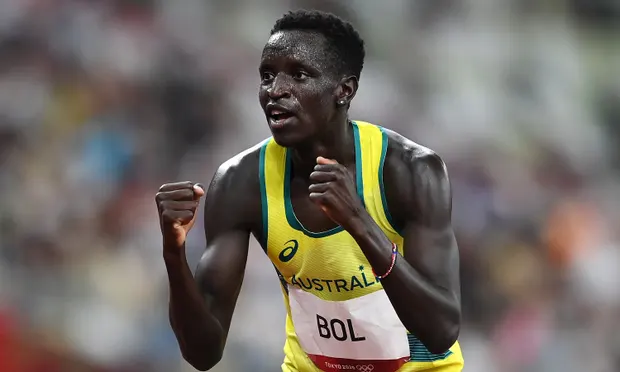When Australian runner Nagmeldin ‘Peter’ Bol led the men’s 800m Olympic track final on Wednesday, an entire nation held its breath, daring to believe.
For the longest minute or so, Bol took the pack almost all the way, setting the pace at the front.
Glued to screens across the country, Australians – millions of them in lockdown – willed him on, their first finalist in the event in 53 years.
Alas, a fairytale ending wasn’t to be. Going into the last bend, Bol was overtaken, and ultimately finished fourth.
“I didn’t know if I was going to win, but I knew one thing for certain,” Bol said after the race. “That the whole of Australia was watching – and that carried me on.”
Capturing hearts
Bol’s runs in Tokyo have set national records; in particular, his semi-final win on Sunday electrified Australia.
Before the final, the potential for a new track champion, a 27-year-old man of Sudanese heritage, energised Australians of all backgrounds. Many read up every detail of his life story.
Born in what is now South Sudan, Bol’s family fled to Egypt when he was four, before migrating to Australia on humanitarian visas four years later.
He went to school in Perth on a basketball scholarship, but his running talent was noticed by a sports teacher before being nurtured by her father and local coaches.
Despite initially resisting the sport, he eventually moved to Melbourne to train full-time, and often spent time away from family for races in Europe.
Just 10 years after entering the sport, Bol, at his second Olympics, has been in the form of his life.
On Thursday, his achievement was widely celebrated. Many also noted how he had help evolve Australia’s conversation about what national heroes could look like.
“Seeing you run your heart out in green and gold gives us great hope for the Australia we know we can be,” wrote Craig Foster, an asylum-seeker advocate and former Australian footballer.
‘What we can aspire to be’
For the Sudanese-Australian community in particular, Bol’s sudden surge to national attention brought much pride.
Australia’s press and politicians have drawn criticism for marginalising the community in recent years, especially with fear-mongering stories about gangs and violence.
“As a South Sudanese Australian struggling with my own sense of identity and belonging, on Wednesday I’ll get to forget that for a few moments, all thanks to Peter Bol, a young man and a symbol of what as a nation we can aspire to be, not just at the Olympics, but every day,” wrote Nyadol Nyuon in a widely shared newspaper piece the day of the race.
But she added that Bol’s achievements should not be “the standard one must attain to be accepted into society”.
In 2021, Bol should be able to held up as an Australian hero both with and without discussions of race, many have argued.
“I want to untie his personal achievements from the yoke of ‘the refugee’, who was ‘born in Sudan but fled the war-torn country when he was four’, so that he may stand in his own glory,” Nyuon wrote.
Bol has also rejected being pigeon-holed.
“I don’t think people should be seen as a refugee or a migrant or something like that,” he said in an interview last year.
“I think it’s better if we have a better conversation, to get to know the person, instead of the assumptions.”
In a newspaper piece this week, he also pointed out that news outlets had often wrongly said he had come from a refugee camp.
He described running as being about “community, finding my place in Australia and learning about myself and the world”.
After the 800m final on Wednesday, a trackside reporter asked Bol what his success meant to Sudanese-Australians.
He replied: “To everyone in Australia, we’re just human at the end of the day. We inspired the whole nation and that’s the goal.”
- BBC NEWS

